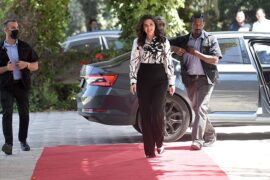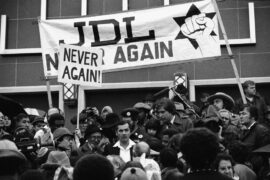The twelfth chapter of a podcast series on the first Book of Maccabees.
For more content from VISION Magazine, subscribe to our newsletter and follow us on Twitter @VISION_Mag_, Facebook and YouTube. If you haven’t already, don’t forget to subscribe to our podcast on SoundCloud, iTunes, Stitcher, TuneIn, or Spotify and leave a rating and review to help us get our message out to a wider audience!
To support the podcast, head over to our PayPal portal and be sure to write a note that your contribution is for the podcast.
Hosted by: Robert Goodman
Transcript:
Shalom Aleikhem! And welcome back to Sefer Maccabim!
Last time we covered a whole lot of ground where most of the events seemed to be either new friendships between Yehonatan and Greek rulers, torn-up treaties between Yehonatan and said Greek rulers or ferocious fights between Yehonatan and said Greek rulers. As the situation stands now, Yehonatan has just won a great victory against Demetrius by the Kinneret. He sees clearly that HaShem’s hand is at work, and granting him all these successes.
As chapter 12 opens, Yehonatan realizes that the Jews haven’t contacted or heard contact from the Roman Senate since Yehuda reached out for the first time back in chapter 8, and several years have passed since then. So Yehonatan decides the time is right to renew the friendship with the Romans. He sends to Rome the same ambassadors whom Yehuda sent the first time, and they deliver Yehonatan’s message to the Senate reconfirming their people’s friendship. The Senate reply in the affirmative that their friendship is as strong as ever.
On the way back, the ambassadors stop by in the Greek city-state of Sparta with a present for the people who live there, the Lacedemonians.
Now apparently the Lacedemonians were synonymous with the Spartans, and they traced their lineage in some way back to Avraham, making them distant relatives of the Jews. Decades ago, Ḥonio the Kohen Gadol had received a letter from them declaring friendship between the two peoples, and offering their assistance in any way required.
Yehonatan had sent the Jewish ambassadors to reconnect with the Lacedemonians, and the message went along these lines: “A long time ago you extended the hand of friendship to us, and we took it gratefully. Although we never needed to take you up on your offers of help, it’s been a long time since you reached out to us so we’re reconnecting with you for fear of becoming like strangers to you. You should know when we offer sacrifices at our Temple we pray on your behalf, and even though we’ve been extremely busy subduing our enemies we never thought to trouble you. We’re here to reaffirm our league of friendship and mutual assistance with you.”
The Lacedemonians receive this message kindly and Yehonatan’s ambassadors have accomplished both their missions.
Returning to Judea: Demetrius is not willing to take his defeat lying down, so he gathers an army even bigger than the previous one and comes to fight Yehonatan. But as soon as Yehonatan hears he marches immediately to meet him, determined not to let Demetrius even set foot in Judea. He pitches camp around six miles from Demetrius and sends spies into the enemy camp. The spies return armed with information: Demetrius plans to attack at night. Clearly he hopes to take them by surprise. So Yehonatan, deciding not to go and attack first, positions watchmen around the camp and instructs his men to remain battle-ready throughout the night.
But the battle never materializes.
That night Demetrius hears that Yehonatan is ready to fight, and he is crestfallen, because he was counting entirely on overcoming the Jews by surprise. He believes that if he were to go up against them in battle, he would lose. So he decides to retreat, but before he does he commands his soldiers to light fires in the camp, to make the Jews think they are all awake, and prevent them from attacking.
The ploy works, and by the time Yehonatan enters their camp the following morning to fight them, he finds it bereft of soldiers. Realizing they all fled overnight, he gives chase, but there’s no way he can catch them, because by this time the enemy has fled so far north they’re out of Judea altogether.
So Yehonatan goes into Arabia and does some fighting there, taking captives and spoils and selling them in Damascus, and afterwards returns to Yerushalayim where he consults with the elders on repairing the walls around the holy city, and also on building a wall to completely isolate the Acra from the rest of the Temple Mount, the idea behind this being to prevent all the Hellenists and mercenaries from being able to leave the tower, even to buy food, and to eventually starve them into submission.
Now at this point Josephus tells us something important not mentioned by the Book of Maccabees.
There are some Greeks living in Mesopotamia, possibly they are descended from the early Greek settlers who came to bring Greek culture to the lands conquered by Alexander the Great. Anyway, these Greeks write to Demetrius saying that if he comes to Mesopotamia, they will join forces with him to help him overthrow the Parthian king. Demetrius eagerly accepts their offer, resolving that as soon as he’s overthrown the Parthian king he’ll come back and take care of Tryphon and Antiochus VI. So he raises an army, goes and fights the Parthians, loses his entire army and gets captured alive himself, and that’s the last we see of Demetrius for a little while.
Now you’ll remember that Tryphon was initially supporting Antiochus VI son of Alexander Balas to be king. But once he hears Demetrius is now being held captive in Persia and essentially out of the picture, his nature gets the better of him. He thinks to himself, “Why do I need to keep working for Antiochus, just because he’s Alexander’s son? I could do much better and become emperor myself.”
So Tryphon begins plotting to kill Antiochus and take the throne for himself. However, he perceives that there’s an obstacle in his path, and that obstacle is Yehonatan. Yehonatan is a good friend of Antiochus and even wears the golden button Antiochus sent him as a present, and Tryphon fears that if he kills Antiochus straight up, Yehonatan will come and inflict revenge on him and Tryphon won’t live to tell the tale. So he decides that before he can overthrow Antiochus, Yehonatan has to go. Like Demetrius, he knows he can’t stand against him in open battle, so Tryphon devises a cunning plan to get rid of the legendary Jewish commander.
Tryphon departs Antioch with his army and arrives in Beit She’an, where Yehonatan, expecting a battle, meets him with forty thousand Jewish soldiers. Confronted with this huge army, Tryphon dares not order his soldiers to fight, but approaches Yehonatan and receives him honorably with gifts, and speaks with him one-on-one.
“Why have you brought all these people against me, considering that there is no war between us? Send them home and come with me to Akko, and I will give it to you, for this is the reason I’ve come.”
Now if Yehonatan knew Tryphon’s true intentions, he might have made this next decision differently. At the time of the Maccabean revolt, Akko was a Hellenistic city and was also walled, and the only way in was through the huge gates built into the wall at the entrance of the city. If you closed the gates, Akko became completely sealed.
Tryphon’s plan was to lure Yehonatan into the city, at which point Tryphon has ordered the city’s inhabitants to shut the gates and lock them, at which point Yehonatan will be at his mercy. But Yehonatan has never met Tryphon in his life, and he seems sincere with the presents and all, so he agrees. He sends most of his soldiers back to Judea retaining only three thousand, of which he sends two thousand into the Galilee and one thousand he brings with him to Akko as an escort.
It’s approaching with the inevitability of a Greek tragedy, I know. As soon as Yehonatan and his men enter the city, the gates are locked behind them and Tryphon reveals his true colors, unsheathing his sword and killing every single one of the thousand who accompanied Yehonatan. Yehonatan himself is taken prisoner.
Tryphon then sends forces to eliminate the two thousand men Yehonatan sent into the Galilee, but they have heard the news about what happened to their leader and those with him, and they are determined to fight for their lives. Seeing their readiness to fight, Tryphon’s soldiers turn back without fighting. The two thousand return to Judea safely and together with all the Torah Jews they mourn Yehonatan’s fate.
After Yehuda HaMaccabi fell at Elasa, Yehonatan stepped in to fill the leadership vacuum. He brought the revolt back from oblivion and has carried the Jews through several years of political and military leadership. He’s revered and respected by the neighboring countries and he’s accomplished feats his brother Yehuda would have been proud of. And now he’s been kidnapped by some enemy tyrant. Even if he’s not dead yet, it’s a great cause for sorrow throughout Israel.
And here we experience a bout of déjà vu. Just as when Yehuda died the Hellenists and Seleucid mercenaries gained confidence and accelerated their efforts to Hellenize the population without mercy, so too after Yehonatan’s capture, as the first Book of Maccabees (12:54-55) tells us:
“The gentile nations surrounding them sought to destroy them, saying, ‘they have no leader! Now let us take vengeance against them, and wipe out their memory from the earth.’”
And this cliff-hanger brings us to the end of chapter 12, when suddenly Yehonatan has gone from being heroic leader to prisoner, and the outlook for the Jews is not so good.
Luckily, there is one surviving son of Matityahu who has not yet been killed or captured. I’m talking of course about Shimon, and in the next chapter he will step up to lead the people.





